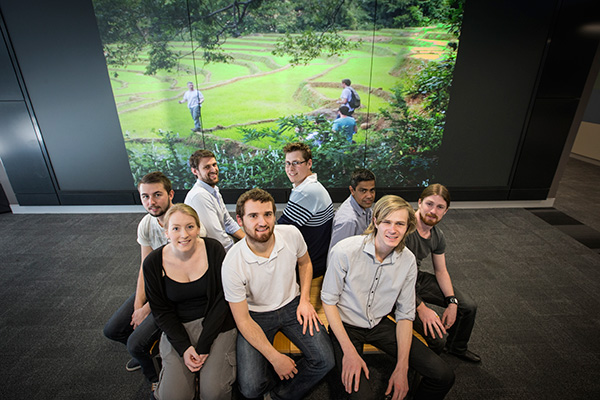September 15, 2014
Engineering students search for solutions for sustainable futures
A 10-day study tour to Sri Lanka has provided engineering students with an exchange of knowledge and ideas that will influence future projects.

Dr Brad Stappenbelt, Dr Tom Goldfinch, and Dr Senevi Kiridena from the Faculty of Engineering and Information Sciences, and Dr Himan Punchihewa from the University of Moratuwa led 10 engineering undergraduate students (pictured above) on a trip to Sri Lanka to observe how sustainable technologies were being implemented in a developing economy.
The trip took in visits to the academic institutions including the University of Moratuwa and the National Engineering Research and Development Centre (NERDC), in Colombo.
The study tour then visited rural and remote villages to see first hand how local engineers were dealing with issues such as waste management and power generation.
The students discovered practical challenges and solutions to problems such as supplying gas to science classrooms at a rural school; small-scale electricity generation in high mountain villages; and energy needs could be met locally through biomass, wind, solar and hydro power systems.
Dr Tom Goldfinch said the projects to design a biogas reactor that generates gas for fuel from waste materials and designing waste management systems were now the focus of first and third year engineering student projects.
“The most important lesson students took from this trip was to see just how much sociocultural and economic factors influence engineering design and practice. The students also took a lot from seeing what true sustainable living looks like in the village of Meemure.”
Bachelor of Engineering (Mechatronics) student Kurt Hutten said the trip had a profound impact on his perspective as an engineer, particularly when he observed the conflict between traditional village lifestyles and technology.
“The highlight of the trip for me was visiting a village that has only had road access for 12 years,” he said. “This village was almost completely self-sufficient and sustainable, which makes it of particular interest to our group since our trip to Sri Lanka had the express purpose of learning about sustainable endeavours in the country and to look for opportunities to implement some of our own ideas.
“In this village we were presented with a community that has already reached this goal of sustainability. If their way of living is sustainable and ours is not then there is much we can learn from them.”
Fellow student Matthew McCann said: “It’s one thing as a student to be shown photos in books and a description of the problem. Nothing can come close to being on the ground, seeing the challenges and hearing how it affects peoples’ lives.”
At the University of Moratuwa, they met the Vice-Chancellor, Professor Ananda Jayewardane, and academic staff to explore the possibilities of entering into future collaborations in areas of renewable energy technologies, international exchange of students and student projects.
The trip was funded by the AsiaBound Student Mobility Fund.